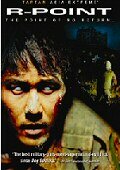|
DVD Review
|
|
|
| Director |
|
Kong Su-Chang
|
| Cast |
|
Kam Woo-Sung
Sohn Byung-Ho
Oh Tae-Kyung
Park Won-Sang
Lee Seon-Gyun
Ahn Nae-Sang
Kim Byeong-Cheol
|
| Distributor |
| Tartan Video |
| DVD Origin |
| United States |
| DVD Release Date |
| 14th February 2006 |
| Running Time |
| 107 Minutes |
| Number of Disks |
| 1 |
| Certification |
|
R
|
|
Reviewed By
|
|
William P. Simmons
|
|
Buy this film
|
|
|
|
|
|
R-POINT (2004)
|
Operating on a philosophical and supernatural dimension similar to Jacob’s Ladder and The Jacket, interweaving philosophical questionings of the soul, emotional anguish, and supernatural possibility, R-Point is a macabre dissection of identity, merging the heart of a ghost story with elements of military tragedy and a style reminiscent of surrealism. Treating Nature, the soul, and such concepts as time, space, and cyclical reoccurrence with intelligence and an emotional terrorist’s attention to pain, this terror tale places spiritually devastating amorality alongside generous explosions of surface action. An unapologetic shriek-show, this spiritually devastating war between spirit and mind, logic and the macabre, tells a fable of crippled ideals and fragmented realities, whipping from beneath us the supposed ’good fabric’ of realism, attacking it from within. This finely chiseled story of war-time suffering, identity, and Otherworld terror is effective not because of what it shows you but what its suggestive atmosphere makes you think.
Immediately submerging viewers into the black heart of murder, spiritual limbo, and troubling questions of honor, a troop of South Korean soldiers are urged by a mysterious radio signal to locate a missing patrol unit. Finding far more to fear than snipers, these carefully conceived characters, each with his own involving emotional history, discover that the miseries of war aren’t confined to the physical territories of the jungle -- they also resonate throughout the dark depths of the unknown. Director Kong Su-Chang's tale of duty, dread, and the fantastic presents a malignant universe destructive in its cosmic amorality and disinterest in the individual. The South Korean army base which receives radio contact from a lost patrol unit must grapple with reduced resources, tested faith, and crippled hope. These very real troubles mirror (and lend greater power to) the occult nightmares lurking in both the mind of characters and the spectrally-infested jungle. As the shell-shocked officer leads his unit on an attempt to locate the ghostly signal, tracking it to ‘R-Point,’ it appears that there are no human presences . . . at least, no living ones. What does haunt its shadowy grounds is wrathful spectral energy that attacks the men’s already conflicted minds.
Equal parts adrenalin rush, surrealistic experiment, and war-time ghost story, R-Point is as troublesomely challenging in its concepts as it is scary on the surface. The director achieves terror through a variety of emotional and visual means, from simplistic if successful shock to the more substantial dread of lingering insecurity. Finding forms for mysterious elements of the unknown that both plague and fascinate us -- particularly in regards to the menacing nature of reality, this Asian supernatural thriller analyzes in its surface imagery and story-line mysteries of the unknown and the all-too-human, exploring areas that so-called ‘realistic’ forms of expression lack either the temper or tools to explore. Creating a cinematic mask of symbols from which we can better see our own dark hearts, this dissection of identity, memory, and perception is not only a modernized spook show, entertaining by making us confront the unknown but also an intellectually challenging, surrealistic nightmare probing assumptions of the nature of reality.
R-Point outreaches its contemporaries by suggesting that life itself is little more than a shadowy purgatory between existences. Refreshingly traditional in its insistence on character-driven narrative, R-Point maintains an emotional and imagistic balance between dark fantasy and war-time tragedy. Director Kong Su-Chang does a commendable job anchoring elements of the unknown in the language of the everyday, and Asia Extreme does an equally fine job with its presentation, offering the film in anamorphic widescreen (1.85:1) with audio in DTS and Dolby Digital 5.1. DVD extras add to our enjoyment, including an insightful directors commentary, “The Making of R-Point,” an above average documentary lending further appreciation to the movie-making process, still another featurette, “Creating 1972 Vietnam,” a look at special effects, the theatrical trailer, and, of course, the usually enjoyable Tartan Asia Extreme trailers. Evoking impressive heights of terror and mystical speculation, R-Point is a bloody good attack!
|
|
Score
|
|
8 / 10
|
|
|





